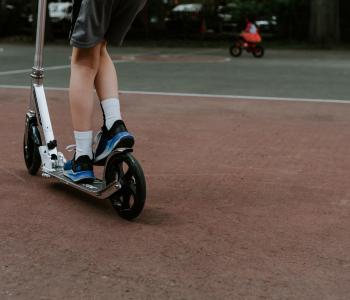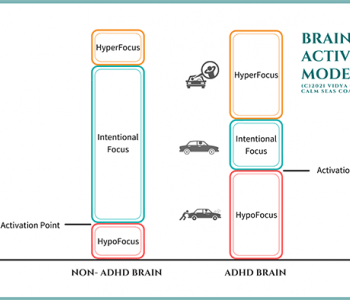
Birthday Parties, the Cafeteria, and Other Social Obstacles
by Caroline Maguire as seen in ADDitude MagazineADHD Education
You need not helicopter to help your child make friends — in fact, too much parental interference can do more harm than good, especially in middle school.
Follow these strategies to boost your tween's confidence and skills in the most challenging settings and scenarios.
You learned that your middle-schooler is skipping lunch to avoid the cafeteria. Should you address it head-on, giving her advice that she probably won’t listen to, or demand that she go to lunch? It is hard to know. The cafeteria is where everyone comes together to socialize and hang out. For a child with ADHD, lunch can be very challenging.
Social struggles are not restricted to school. Children have the same deficits at home, at stores, on the ball field, and in every life setting. Many kids want to improve their friendship skills, but don’t know how. That’s where you come in.
Working with your child to meet social challenges leads to behaviors that your child can use everywhere. The following strategies will help your child make friends — and move through the socially difficult years of adolescence more easily.
How do I help my son stop avoiding the school cafeteria?
Children avoid the cafeteria because they are bullied, but also because they don’t know how to interact with peers, join a conversation, or even where to sit.
> Debrief your child. Without telling your child he is doing anything wrong, ask open-ended questions to find out what he thinks is happening. Ask about whom he sits with, when he feels uncomfortable, or if there are friends he would like to sit with.
> Practice skills. Nothing is tougher for kids than joining a conversation that is in progress. Suggest a little detective work. Ask your child to go to lunch, listen to what everyone talks about, and report back. You and he can role-play conversations that build on the topics the group talks about most often.
> Get outside help. Avoidance is not a plan, so if your child can’t navigate social situations, have her work with a professional social skills group.
How can I help my child when she isn’t invited to class parties?
If a child isn’t invited to birthday parties, concerts, or other peer activities, it is time to team up and find out what might be causing the problem.
> Discuss things, without blame, to help your child diagnose why she isn’t fitting in. Walk her through her day at school and ask her to recount one or two of the social interactions she had — what she said to a classmate, how that child reacted — and discuss what she thinks she could have done differently.
> Talk about different types of friendship. Many children with social challenges try to make friends with kids who do not share their interests, or they misinterpret social cues and think any friendly person wants to be friends. Help your child understand different kinds of “friendships”: There are people you say hello to, acquaintances, people you interact with, and real friends. Brainstorm with her about ways to befriend children with whom she shares interests and who treat her well.
> Find ways to meet others with similar interests — social clubs, youth groups, and other interest-based activities. These places give your child a chance to socialize by talking about things the kids like in common.
How can I make group projects less intimidating for my daughter? Group projects are tough for her because she has to contribute, advocate for her ideas, participate in the discussion, and present a final project. The following case study shows how to make group projects less challenging for your child.
Ali is 12 years old, and she hates group projects. She and her mom write the teacher asking for advice about what she can do better in the next group project. The teacher says Ali should speak up more and identify a role she would like to take on in the project.
Ali’s mom understands the unspoken social dynamics in play — children meet in large groups, and assumptions are made about Ali and what she might be able to do on the project. Ali is left out of the decision-making because she doesn’t speak up. Ali and her mom discuss the personalities within the group, their likes and dislikes, and so on. Ali puts together a social database about her partners in the group project, so she can talk more comfortably with her peers.
Ali does better socially when she has a plan. She and her mom look at the project rubric and discuss which components seem interesting and manageable to Ali, and decide what Ali would like to take on. They rehearse possible scenarios. Role-playing, and learning how to ask open-ended questions, helps Ali build the confidence to speak up during the group’s discussions.
With all the prep at home, Ali slowly overcomes her social struggles and plays an important part in the group. And she has a plan she can use for the next group project.
My son has lots of virtual friends, but how do I encourage him to develop friends he can talk with one-on-one?
Connecting to other people, adapting to their needs, and engaging in the give-and-take of friendship are important skills all kids need to learn.
> Let him have virtual friends. Facebook friends and Twitter buddies may be your son’s only friends right now, and you don’t want him to lose them.
> Talk to him about why he needs other friends. Ask your child what he likes about the virtual world. Find another activity that he may like — a course in robotics or computer coding — in which he will interact with people.
> Work on social strategies. Whether it’s engaging in chitchat, turning an acquaintance into a friend, or arranging to see people outside of school, it is essential that your son knows how to approach people. With consistent practice, he will get what you and every child wants: good friends.
(Originally posted on ADDitude: Strategies and Support for ADHD & LD)












